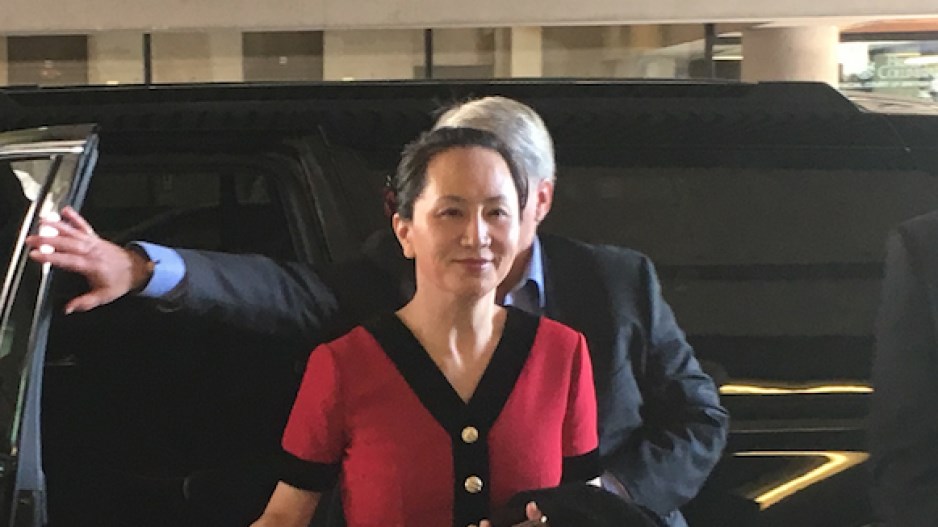The Meng Wanzhou extradition-related legal proceedings continue on Tuesday as Crown prosecutors resume making their case that the three-hour Canada Border Services Agency (CBSA) detainment without arrest of the Huawei CFO was proper.
Prosecutors yesterday stated that it was pure logical procedure for a border check to take place when an individual arrives in Canada, and the fact that Meng had an arrest warrant waiting for her does not automatically take precedent, since Meng’s fate was not predetermined by authorities and were dependent on her interview with CBSA.
However, Justice Heather Holmes opened Tuesday’s proceeding questioning the Crown’s stance, noting the Crown’s contention that Meng – even if rejected for admission – would have been held in CBSA jurisdiction and be open to be served her arrest warrant by the RCMP.
Prosecutors maintain that all likely outcomes of Dec. 1, 2018, would have resulted in Meng’s arrest – but there was no pre-meditated conspiracy to violate Meng’s charter rights, as was contended by her lawyers.
The issue of the CBSA agents’ ability to issue warrants also came into debate. The Crown argued that – using a federal case decision on military police officers arresting a drunk driver a few years back – that a peace office (such as the military police and CBSA agents) does not have general arrest warrant authority beyond its predetermined jurisdictions.
Further, Crown prosecutors cited previous cases of Canadian border officers working in close contact with authorities in countries such as the United States and South Korea to hold and assess the admissibility of someone facing criminal charges in another country.
In those cases (against a convicted murderer and a fraudster, respectively), judges said, “It is expected that authorities cooperate,” argued the Crown. “Communication is necessary to pursue the upholding of Canadian immigration law.”
On the key point from Meng’s defence that the CBSA seizure of the Huawei executive’s phone and password was unusual, the Crown called the move “lawful and reasonable.”
“There’s no doubt that the RCMP and the FBI would be interested in the phones and may be concerned that the devices can be wiped remotely,” Crown prosecutors told the court. “But there’s no evidence that the CBSA isn’t interested in the phone for its own legitimate purposes.”
The Crown also said that – while there is precedent where CBSA should alert a person of their charter rights if there is a criminal investigation in Canada – such circumstances do not exist for Meng and, therefore, officers “can go as far as they need to” in assessing Meng’s admissibility.
Holmes again expressed concern, however, noting that the question at hand isn’t about the presence of a Canadian criminal investigation, but rather if the CBSA evidence would go to support a criminal case in another country – in this case, the United States.
The Crown again stated there is no evidence that the CBSA conducted the search of Meng with anything other than its own admissibility concerns centred on “criminality” involved.
In fact, Crown prosecutors pointed to the fact there was a border entry check as proof that the CBSA was not acting solely on the RCMP and FBI’s direction, since it showed border agents wanting to find out out the facts surrounding Meng themselves.
“Had they stood aside and let Ms. Meng go through, that would show a lack in independent decision making,” the Crown said.
Justice Holmes questioned the Crown on that point, noting that the CBSA agents did pass Meng’s cellphones and passwords on to the RCMP officers on Dec. 1, the day of Meng’s detention and arrest. But prosecutors contend that it is an isolated error that should not mar the overall case that the CBSS acted independently.
“When we consider this part, there was an error,” the Crown responded to Holmes. “But we have to look at the entire context of the law... The CBSA did ask for the password back, and the RCMP said it had already been filed. There’s no evidence that the password has ever been used.”
The Crown wrapped up its day on Tuesday by launching into debating the merits of the word “immediately” as stated in Meng’s arrest warrant, noting that there are circumstances that must be considered – and that “immediately” does not equal “instantaneously.”
Prosecutors also emphasized the Meng’s case was especially unique, given that it is an international treaty obligation (ITO) based on a request by the United States, and there are legitimate questions about Meng as a flight risk - and the question of whether it is in the public’s interest to detain and arrest her.
"In the case of an ITO, [Canadian] officers must accept information from the requesting state," crown counsel said. "There may be some investigation work, but on the large part, they must trust the requesting state... The fact that Ms. Meng was a permanent resident of Canada previously and her visa status as a temporary visitor does not detract from the underlying factions [of the case] that supports an ITO. Ms. Meng has not responded to why her travel plans changed [in not visiting the United States since 2017]."
Tuesday - incidentally China's National Day - also saw the proceedings attended towards the end of the day by the Chinese consul general in Vancouver, Tong Xiaoling. The case has been high on Beijing's radar since unfolding last December, precipitating in a deep freeze in Canada-China trade relations.
The hearing will resume Wednesday.




